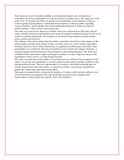| dc.description.abstract | This research set out to establish whether or not traditional gender role socialization is
responsible for the low participation of women in Kenya's political arena. The objectives of the
study were: To examine the effects of gender-role socialization on the potential of Kenyan
women's political participation; to determine the perceptions of Kenya's public regarding
women in politics; and to identify the current participation patterns of Kenyan women in
political parties, workers unions and local groups.
The study was done in four districts in Nairobi. Data were collected from 200 study subjects
using a standard structured questionnaire and analysed using the statistical package for the social
sciences computer programme. The fmdings are presented using frequency and percentage
tables, graphs and narratives.
The fmdings of the study indicate that the public is generally interested in what happens in the
political arena and they keep abreast of these activities. However, all the female respondents
intimated they have never offered themselves as candidates in political party elections. Their
participation was confined to discussion of political issues at hand and voting in elections. A
small percentage indicated that they also participate in street demonstrations. The study also
established that women had a right to participate in politics and that a high percentage of the
respondents would vote for a woman during elections.
The study concludes that while gender ro'le socialization may influence the perceptions of the
public, it is not the main hindrance to women's political participation and their visibility on the
national political scene. There are opportunities for women to start their leadership quest in
smaller organizations like trade unions, co-operative societies, social groups and political
parties, but women have not risen to cease them.
This paper recommends that to increase the numbers of women on the national political scene,
women should be encouraged to first seek leadership positions in the 'stepping stone'
organizations to help acquire the requisite skills and confidence. | en |

